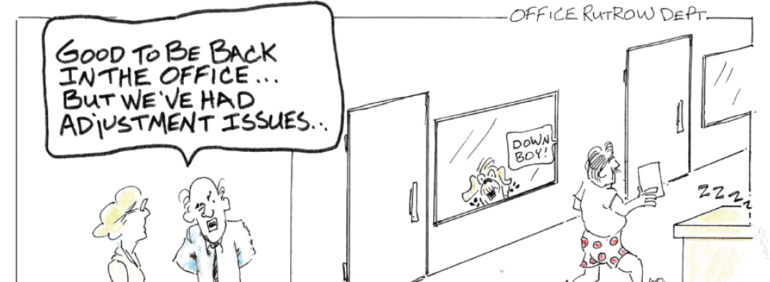
By Edward McIntyre
Macbeth opened the firm’s Zoom happy hour with a Scots Gaelic toast. “Slàinte Mhath!”
Sarah, Duncan, and Barb, the firm’s paralegal, responded, “To your good health.”
“I invited Pete McDonough and Deb Granholm to join us.”
Raised glasses of amber liquid all around. “Welcome!”
“Pete, Deb, thanks for joining us. What long-term issues do you see coming out of this plague? Now that vaccines are here?”
McDonough spoke first. “Our lawyers have gotten used to working remotely. They like it. I think they’ll want to continue. Or many of them. Even if we get back to normal, whatever that may mean.”
Macbeth spoke. “Your firm, Deb?”
“The same. It’s given our lawyers a lot more flexibility. Especially younger lawyers. They’re tech smart. Great for those with young kids not in school because of COVID or not of school age.”
“How’s that impacted your ability to mentor? To supervise?”
Granholm picked up the thread. “Tough. Younger lawyers used to get informal mentoring, have questions answered, test ideas, just by walking down the hall. Now they have to set up an appointment. Or take their chances with a call. Get a busy signal more often than not.”
McDonough spoke. “Same with us. I could mentor and supervise associates with informal chats. Review work sitting side-by-side. Do it at lunch. Over a beer. Now it takes a lot of effort. I’m not sure we’re doing all that good of a job.”
Macbeth again. “That could present problems for firm managers and anyone who supervises other lawyers.”
Sarah added. “And non-lawyer personnel, as well.”
“Excellent point, Sarah. Our current rules require firm managers to make sure their firms have measures in effect to ensure lawyers and non-lawyers comply with the rules and State Bar Act.”
Sarah added. “Other rules require lawyers who supervise to make sure those they supervise also comply.”
Macbeth spoke. “Thanks, Sarah. Pete, Deb, if remote practice becomes a norm, based on your pandemic experience, management and supervision obligations may present difficult ethical issues.”
Granholm responded. “I agree, Macbeth. We’ve tried firm meetings, department meetings, practice group conferences. Reminded partners about mentoring. Supervision. Mixed results, at best, I’d say.”
McDonough nodded. “Our experience as well. What do you do, Macbeth?”
“Well, we’re lucky. We’re a small firm. Only four of us. We start each day with a Zoom meeting. Just a three-point agenda. Each person’s schedule for the day. Pending deadlines. Then, any questions or ideas anyone has. Sarah, Duncan, and Barb can comment, but I think it’s a worthwhile procedure to have in place.”
Duncan responded. “It’s great. Keeps me focused. Chance to get answers. Brainstorm.”
Sarah spoke. “I agree. Typically, it takes only 5 or 10 minutes. Sometimes a half-hour if something important comes up.”
Barb nodded. “Great way to make sure we’re all conscious of deadlines. I don’t like surprises.”
Macbeth picked up. “Then mid-morning I set up another Zoom meeting. Just to see if anyone has any questions. If any issues have come up. Finally, toward close of day, same thing.”
Granholm’s digital hand went up. “How much time does this take, on average?”
“Most days, less than an hour for all three meetings. I also have a separate cellphone that Sarah, Duncan, and Barb can call any time. Never use it for anything else — just calls from them. Avoids the busy signal problem.”
Duncan added, “Mention the virtual lunch dates, Uncle.”
“Thanks, Duncan. Each week, Sarah, Barb, Duncan, and I have a Zoom lunch — separately. Firm buys. Lasts as long as each wants. Typically, half an hour, 45 minutes. Easy way to stay in touch. Focus on career issues. Anything each wants to talk about.”
Duncan interrupted. “If I could only get Macbeth to appreciate the virtues of quattro fromagi pizza.”
“Be glad it’s not haggis. Finally, we have our weekly happy hour. We try not to talk shop, but it’s not offthe table.”
Granholm spoke. “That works great for your small group. But what about a firm our size?”
“What’s your partner/associate ratio?”
“We’re about 1 to 4. Why?”
McDonough started to smile.
Macbeth continued. “So, counting Barb, you’re just about our size — if each partner mentored four associates. You could try something like what we do. Or experiment. COVID begs for innovation.”
“But getting each partner —”
“Think of the value to the firm. The profession. That’s how we learned. Then you could always ask them to read rules 5.1 and 5.3 and consider the consequences.
McDonough raised his glass. “To Gaelic wisdom!”
Macbeth raised his glass. “To post-pandemic practice and health to all.”
Edward McIntyre (edmcintyre@ethicsguru.law) is a professional responsibility lawyer.